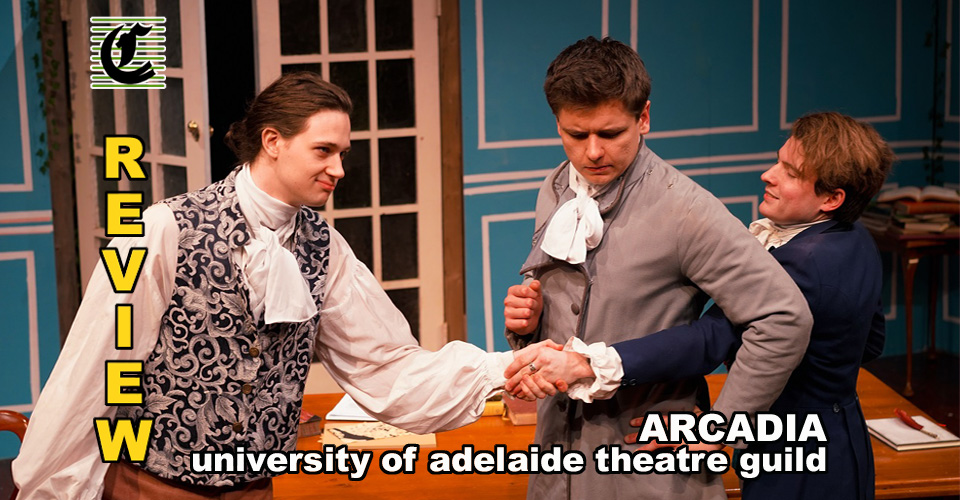[THEATRE/Drama ~ SA]
Little Theatre, University Of Adelaide, Thu 11 Aug.
Touted by some as one of the best plays of the modern era, Tom Stoppard’s Arcadia is certainly based around a great idea. An upper class family from Derbyshire go about their lives on their country estate in the early 19th Century while sharing ideas on the nature of existence, science, poetry. And sex. They leave clues behind – books, poems, annotations in margins, diary entries – all of which are found and examined by researchers of life on that same estate 200 years later. An academic, an author and a biologist all try to decipher the true meaning of these clues in their attempts to document the estate’s past. The infamous poet Lord Byron is a key figure in their enquiries, though we never meet him. We do, however, have the great pleasure of meeting one of his contemporaries – a minor poet called Ezra Chater. Chater is a cocky little rooster who is delightfully played by Maxwell Whigham and has that rare ability to generate laughter just by their stage presence.
The action swaps back and forth between past and present. It all takes place in the same room around the same table. It’s a simple and effective way of connecting the characters across the centuries. Leading the charge of the modern researchers is literature professor Bernard Nightingale (played by John Rosen.) He is convinced he has discovered proof that Byron visited the estate and the reasons why the famous poet suddenly disappeared to Portugal. Like a true academic he is so full of his knowledge and theories that he doesn’t pause to wonder if anyone is interested in what he has to say, or notice that there is a young woman (Chloe) falling madly in love with him. He talks non-stop, in what is however, a commanding performance from Rosen. His opposite protagonist in their research endeavours is writer Hannah Jarvis (sensitively played by Allison Scharer) who has other views about what the clues from the past mean. In contrast to Bernard she is measured, rational, and a wonderful listener.
Also notable is Kate Anolak’s performance as Lady Croom. The lady of the estate carries a definite authority whenever she appears to keep things on track and in order. Great comic timing and a slightly detached air create the impression that she ignores everyone but knows everything.
Arcadia had been described as ‘one of the best science works ever written.’ There is much discussion around mathematics, physics, and chaos theory, but at other times will equally satisfy more right-brained thinkers with a focus on romanticism, literature, and philosophy. Despite this rather heady list of topics the play is far from turgid or verbose. Occasionally passages of dialogue were delivered from characters with their back to the audience. This is difficult to completely avoid in the almost circular Little Theatre, but it does mean some lines can get lost. However, engaging interaction between characters and frequent movement within and between scenes kept things lively.
Science, philosophy and mathematics are all very important and very grand but in the end perhaps all we really wanted to know is will the obvious sexual attraction between the teenage Thomasina and her more mature tutor be realised?!
3.5 stars
Michael Coghlan
Arcadia continues at the Little Theatre, The Cloisters, Victoria Drive (Gate 10), University Of Adelaide, from 7.30pm until Sun 21 Aug.
Bookings at Theatre Guild. Click HERE to purchase your tickets.

Michael Coghlan
A modern classic examines 19th century life through a contemporary lens.




